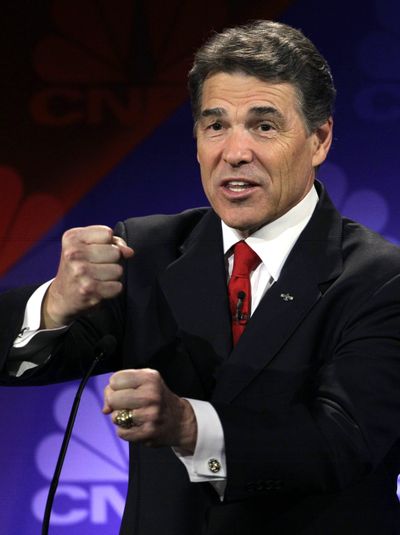Perry suffers ‘oops’ moment
During debate, Texas governor can’t name all three departments he would cut

ROCHESTER, Mich. – The Republican presidential candidates met Wednesday night on a Michigan debate stage to address the most critical issue facing the American people: the worrisome economy. But the session may best be remembered as the one that provoked a painful gaffe by Texas Gov. Rick Perry.
Perry, who struggled in his previous debate performances and plummeted in opinion polls as a result, was touting the three departments that he would cut to curb the size of the federal government. He named two – education and commerce – but for an excruciating period searched his mind for the third, as competitors tried to help him out.
Reporter John Harwood, one of the debate’s moderators, pressed him: “You can’t name the third one?”
“I can’t,” Perry replied. “The third one, I can’t. Sorry. Oops.”
Later in the debate, Perry remembered that he wanted to also eliminate the Energy Department and appended that information to his response.
The moment – “I stepped in it, man,” the governor told reporters afterward – stood out from the mostly placid debate, in which businessman Herman Cain delivered a spirited, and largely unchallenged, defense against sexual harassment charges.
“The American people deserve better than somebody being tried in the court of public opinion based on unfounded accusations,” Cain said to a roar from the debate audience.
Given a chance to weigh in on the controversy surrounding Cain, who has issued a series of contradictory statements about his allegedly boorish behavior, former Massachusetts Gov. Mitt Romney demurred.
“Herman Cain is the person to respond to these questions,” Romney said when asked by Harwood – to groans from the audience – whether he would keep Cain in charge of a corporation he was running. “He just did.”
With that, the issue that has consumed the GOP presidential race for nearly two weeks became a brief and passing footnote in the debate. It was typical of an evening in which the candidates repeatedly ducked the chance to engage one another.
Cain, a former corporate chief and the co-leader in some opinion polls, entered the evening shadowed by accusations of sexual harassment and other inappropriate actions involving women during his years as head of the National Restaurant Association, a Washington trade group.
In vehemently denying the charges, Cain has accused various entities and interests – among them Perry – of bringing the allegations to public notice. But standing just a few feet away from the Texas governor, Cain said nothing to his opponent. Perry was also silent on the subject, which came up 20 minutes into the two-hour session.
The debate was the ninth of the GOP presidential contest and the first since a raucous session last month in Las Vegas, a forum dominated by several raised-voice, finger-pointing exchanges between Romney and his rivals, chief among them Perry.
This time, in stark contrast, the most spirited exchanges involved sharp questions from the moderators and the discontent – registered as boos and hisses – from the audience over the Cain controversy being broached.
Harwood pressed Romney about his reputation for bending to suit the prevailing political winds, asking how voters can be persuaded his positions are rooted in something more than ambition.
“I think people know me pretty well,” Romney responded. “I think people understand that I’m a man of steadiness and constancy. I don’t think you are going to find somebody who has more of those attributes than I do.”
Given a chance to respond, Perry this time ignored his opponent. “The next president of the United States needs to send a powerful message not just to the people of this country but around the world that America is going to be America again,” Perry said.
The debate on the campus of Oakland University in the Detroit suburbs was co-sponsored by the Michigan Republican Party and CNBC, the business channel.